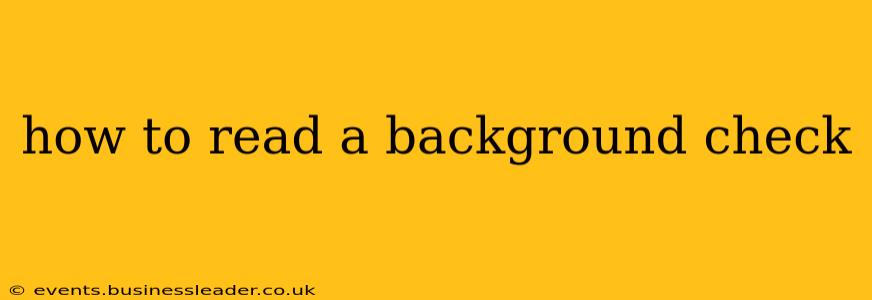Understanding a background check can feel overwhelming, but with a clear understanding of its components, you can navigate the information effectively. This guide breaks down how to interpret the various sections of a background check, addressing common questions and providing context for accurate comprehension.
What Information is Typically Included in a Background Check?
Background checks generally compile information from various sources to paint a picture of an individual's past. Key components typically include:
-
Personal Information: This section verifies basic identifying details like full name, date of birth, social security number, addresses (current and past), and sometimes even known aliases. Inconsistencies here may warrant further investigation.
-
Criminal History: This is perhaps the most scrutinized part. It details any arrests, charges, convictions, and sentencing information. Note that an arrest doesn't equal a conviction; a charge means an accusation was made, while a conviction signifies a guilty plea or verdict. The details of each incident, including the date, location, charges, and disposition (e.g., dismissed, acquitted, convicted), are crucial.
-
Employment History: This verifies past employment, including job titles, dates of employment, and sometimes even reasons for leaving. Discrepancies here could raise flags.
-
Education History: Similar to employment history, this verifies educational background, including schools attended, degrees earned, and graduation dates.
-
Credit Report (if applicable): Depending on the type of background check, a credit report may be included. This will detail credit history, including credit scores, payment history, outstanding debts, and bankruptcies.
What Do Different Types of Background Checks Reveal?
The depth and breadth of information vary depending on the type of background check:
-
National Background Checks: These searches across multiple databases nationwide, yielding a more extensive record.
-
State-Level Background Checks: These focus on a specific state's records and may uncover information missed by a national check.
-
County-Level Background Checks: These checks provide the most localized information, often detailing court records from a particular county.
-
Pre-Employment Background Checks: These often focus on criminal history, employment, and education verification to assess suitability for a job.
-
Tenant Background Checks: These primarily focus on rental history, criminal history, and sometimes credit information to assess a potential tenant's reliability.
How to Interpret the Information in a Background Check?
Reading a background check requires careful attention to detail. Focus on:
-
Dates: Understanding the chronology of events is essential for interpreting the information's significance. An older conviction may be less relevant than a recent one.
-
Disposition of Charges: Distinguish between arrests, charges, and convictions. An arrest doesn't mean guilt, while a conviction represents a formal judgment.
-
Jurisdiction: Note where the incident occurred, as laws and record-keeping practices vary by state and county.
-
Expungements and Sealings: Be aware that some criminal records may be expunged (erased) or sealed (kept confidential).
What if I See Errors or Inaccuracies in My Background Check?
If you discover errors or inaccuracies, you have legal rights to dispute them. Follow the procedures outlined by the reporting agency, usually involving submitting documentation to correct the mistakes.
What Does a "Clean" Background Check Mean?
A "clean" background check typically indicates no criminal convictions, negative credit information (if applicable), or other significant red flags. However, remember that even a clean report doesn’t guarantee future behavior.
Can I Get My Own Background Check?
Yes, you can obtain your own background check through various online services. This allows you to proactively review your personal information and address any potential issues.
How Long Does a Background Check Take?
The turnaround time for a background check can vary based on the type of check and the agency conducting it. It can range from a few days to several weeks.
This comprehensive guide provides a foundational understanding of how to read a background check. Remember, always consult with legal professionals if you have specific concerns or questions about your rights and the interpretation of your background check.
